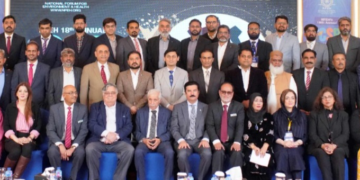(June-10-2023)Chairman of National Business Group Pakistan, President Pakistan Businessmen and Intellectuals Forum, and All Karachi Industrial Alliance, and former provincial minister Mian Zahid Hussain said on Saturday that the budget is overall balanced.
Attention has been given to every sector except the industrial sector. The cost reduction of the industrial sector has not been addressed, so the export and manufacturing sectors will not be able to achieve the target, he said.
“Agriculture, SMEs, IT, solar, and many other sectors will get a boost due to the budget measures,” he added.
Mian Zahid Hussain said that an increase in minimum wages, salaries, and pensions and tax exemptions for businesswomen and youth are laudable, while a further hike in tax rates on non-filers is needed.
Talking to the business community, the veteran business leader said that the incentives to several important sectors to develop the economy are wanting but appreciable and they will give a clear and correct direction to the economy.
He said that Prime Minister Mian Shehbaz Sharif has said that the budget has been made keeping in mind the recommendations of the IMF, so it is expected that things will move forward positively from the IMF.
The tax revenue target has been increased by 30% to 9200 billion rupees, which will be difficult to achieve by burdening the existing taxpayers. There is scope for tax collection of two thousand billion rupees.
The non-tax revenue has been estimated at three trillion rupees. There is a deficit of about seven thousand billion rupees in the current budget. After deducting the provincial share of Rs 5276 billion and the interest payment of Rs 7300 billion, there will be nothing left, and borrowing will be necessary to meet the budget deficit.
Mian Zahid Hussain said that the IMF wants a half percent primary budget surplus, which has decreased by 150 billion rupees, while the increase in salaries will require 100 billion rupees. This difference of 250 billion rupees will not be accepted by the international institution, for which it will be necessary to introduce a mini-budget.
He noted that the difference between the official and non-official dollar rates has to be reduced, otherwise, it is impossible to achieve the target of remittances.
He said that in the absence of loss prevention in the electricity and gas sectors, a privatisation programme, and import substitution, it is impossible to run the country without the IMF while the talk of Plan B and C makes little sense.




















